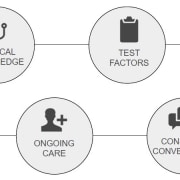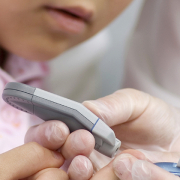Framework for communicating genomic results: reviewers sought
We are inviting feedback on a new competency framework that outlines the key elements required for healthcare professionals to communicate genomic germline test results
In collaboration with a range of healthcare professionals, organisations and patient contributors, the Genomics Education Programme (GEP) is developing a nationally agreed, cross-professional competency framework to communicate genomic test results. We would now like to open this framework for wider consultation.
Why is this framework needed?
The NHS in England is implementing a Genomic Medicine Service, leading to the increased utilisation and mainstreaming of genomic testing across a growing number of specialties. This has resulted in a requirement for workforce development to ensure all healthcare professionals who access genomic testing are competent to do so and are able to address the unique considerations of genomics, including the uncertainty of genomic information, complexity of results and impact on the wider family.
In 2019, the GEP published a competency framework for facilitating genomic testing, including the knowledge, skills and behaviours needed to seek patient consent for and request a genomic test. There is also a need to establish competencies for communicating the results of a genomic test, as this can be a complex and challenging time for patients and family members.
What is the framework?
This framework outlines six areas of proficiency for healthcare professionals who are responsible for communicating germline genomic results. It is aimed at healthcare professionals currently working in the NHS, and is intended as a cross-professional guide for best practice.
In order to demonstrate the potential use of this framework across a range of tests and areas of practice, the competencies have been mapped against a matrix, outlining three broad levels based on the type of genomic tests and associated competencies required. Of note, these levels do not pertain to specific role titles or professions, and should be considered based on the context of the test and scope of practice.
How can this framework be used?
The framework can be used by individual healthcare professionals as a guide to help them identify their learning needs. For educators and trainers, the framework provides a mechanism to recognise the training needs of health professional groups, and to structure training so that conversions about genomic test results can be delivered consistently across different specialties. This framework will also guide the development of future tools made by the GEP to support the NHS workforce.
What input do we need?
Throughout 2019 and 2020, meetings took place with a range of stakeholders including healthcare professionals in various disciplines, as well as patient and public contributors. The framework was developed via a consensus approach based on the nominal group technique, including reviewing clinical scenarios in iterative rounds, mapping themes and voting on areas of inconsistency.
Before this framework is finalised, we are inviting individual healthcare professionals and professional bodies to review the current framework. The final version will be published along with case studies of how the framework can be used in practice.
The framework can be viewed here, and you can send us your feedback using this form. The feedback period will remain open until Friday 30 April 2021. If you have any queries while reviewing the framework and providing feedback, please contact us.
Acknowledgements
We would like to thank the healthcare professionals, as well as the patient and public contributors, from the Genomics England Participant Panel, Unique and Genetic Alliance UK for their support in developing this framework.









